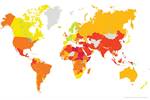Published on Fri, 2017-06-23 10:40
States should control corporations across national borders to protect communities from the negative impacts of their activities, UN human rights experts have said in an authoritative new guidance * on the Obligations of States parties to the International Covenant on Economic, Social and Cultural Rights (CESCR) in the context of business activities. “States should regulate corporations that are domiciled in their territory and/or jurisdiction. This refers to corporations which have their statutory seat, central administration or principal place of business on their national territory,” the experts of the UN Committee on Economic, Social and Cultural rights say in the guidance*, officially termed the General Comment, published on June 23rd. |
Published on Fri, 2017-06-23 10:09
The world economy has not still recovered from the effects of the financial crisis that began almost a decade ago first in the US and then in Europe. Policy response to the crisis, the combination of fiscal restraint and ultra-easy monetary policy, has not only failed to bring about a robust recovery but has also aggravated systemic problems in the global economy, notably inequality and chronic demand gap, on the one hand, and financial fragility, on the other. It has generated strong destabilizing spillovers to the Global South. Major emerging economies that were expected a few years ago to become global locomotives have not only lost their momentum, but have also become highly vulnerable to trade and financial shocks. |
Published on Thu, 2017-06-15 22:50
"What we have to ask ourselves is this: is Africa in control of our resources or is Africa entangled in this global system of accumulation which was brought by colonialism? How do we escape that bondage?" summarized Mela Chiponda, a participant at the Second annual WoMin Feminist School, hosted by Netright Ghana. "We didn't have title deeds, the land was not demarcated, nobody knew the acreage of their farms. So when we learned about this, the government came in and started to demarcate. and there was pause in the mining activities. But we are worried. It feels like a lion we have chased off, and it's lying in the grass waiting" said Sarah Makau, from Kenya. |
Published on Thu, 2017-06-15 22:26
Last June 12 two committees of the European Parliament voted on new tax transparency requirements for multinational corporations. While the outcome would strengthen the text proposed by the European Commission, a proposal by the Liberals and Conservatives introduced a dangerous loophole. The issue will now be sent to the plenary of the European Parliament for a final decision. "Until now, the European Parliament has been in favour of letting the public know what multinational corporations pay in taxes and where they do business,” said Tove Maria Ryding, Tax Coordinator at Eurodad, the European Network on Debt and Development. “But tonight, at the expense of the rest of society, the Liberals and Conservatives decided to protect large multinational tax cheats by introducing a loophole, through which they can continue dodging taxes. |
Published on Thu, 2017-06-15 22:07
The number of countries experiencing physical violence and threats against workers has risen by 10 percent in just one year, according to the annual ITUC Global Rights Index. Attacks on union members have been documented in fifty-nine countries, fuelling growing anxiety about jobs and wages. The report shows that corporate interests are being put ahead of the interests of working people in the global economy, with 60 per cent of countries excluding whole categories of workers from labour law. |
SUSCRIBE TO OUR NEWSLETTER







